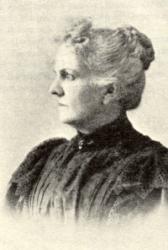Planning worship?
Check out our sister site, ZeteoSearch.org,
for 20+ additional resources related to your search.
- |
User Links
Search Results
O let your light shine in the darkness
Author: Laura E. Newell Appears in 3 hymnals
O let your light shine in the darkness
[Oh, let your light shine in the darkness]
Appears in 1 hymnal Composer and/or Arranger: J. H. Kissinger Incipit: 53235 31264 31327 Used With Text: Oh, Let Your Light Shine
[Oh, let your light shine in the darkness]
[Oh, let your light shine in the darkness]
Appears in 1 hymnal Composer and/or Arranger: J. F. Kinsey Incipit: 55351 51311 11211 Used With Text: Oh, Let Your Light Shine
[Oh, let your light shine in the darkness]
Oh, Let Your Light Shine
Author: Laura E. Newell Hymnal: Apples of Gold #4 (1890) First Line: Oh, let your light shine in the darkness Refrain First Line: Oh, let your light shine, his vict'ries to win Languages: English Tune Title: [Oh, let your light shine in the darkness]
Oh, Let Your Light Shine
Oh, Let Your Light Shine
Author: Laura E. Newell Hymnal: Augsburg Songs No. 2 #27 (1893) First Line: Oh, let your light shine in the darkness Languages: English Tune Title: [Oh, let your light shine in the darkness]
Oh, Let Your Light Shine
O let your light shine in the darkness
Author: Laura E. Newell Hymnal: Augsburg Songs, Nos. l and 2 Combined #d224 (1895) Languages: English
O let your light shine in the darkness
J. H. Kissinger
b. 1845 Composer of "[Oh, let your light shine in the darkness]" in Augsburg Songs No. 2
J. H. Kissinger
John F. Kinsey
1852 - 1915 Person Name: J. F. Kinsey Composer of "[Oh, let your light shine in the darkness]" in Apples of Gold Late 19th Century
Kinsey’s works include:
Pearls and Diamonds for the Sunday School (Lafayette, Indiana: Echo Music Company, 1892)
Music--
ECHOES OF GLORY
HUATULCO
PEARLS AND DIAMONDS
REJOICE, THE KING IS RISEN
--www.hymntime.com/tch
John F. Kinsey
Laura E. Newell

1854 - 1916 Author of "O Let Your Light Shine" Born: February 5, 1854, New Marlborough, Connecticut.
Died: October 13, 1916, Manhattan, Kansas.
Daughter of Mr. and Edward A. Pixley, but orphaned as an infant, Laura was adopted by her aunt, then Mrs. Hiram Mabie, who at the time lived in New York. In 1858, the Mabie family moved to a farm south of where Wamego, Kansas, now stands. Two years after the move, Mr. Mabie died, and his wife resumed teaching.
In 1860, Mrs. Mabie accepted a position in Topeka, Kansas, where she taught many years. Under her tutelage, Laura received her education. As early as age 12, Laura was writing rhymes, and two years later her poems began to appear in local newspapers. She had no thought of a literary career; she simply wrote to give vent to her poetical mind.
In 1871, Laura married Lauren Newell, a carpenter from Manhattan, Kansas. They had at least six children, and belonged to the Congregational denomination.
In 1873, Laura was listening to an address by a speaker who lamented the death of "genuine" hymns, and she resolved to try her hand in that line of work. That began a long period of writing songs, sacred and secular, services for all anniversary occasions, cantatas, adapting words to music, and music to words.
"Mrs. Newell is indeed a prolific writer. Her poems number in the thousands. She has had over eight hundred poems published in a single year, a most remarkable record. The great ease with which Mrs. Newell writes is one of her special gifts. Not long since an order, accompanied by music and titles, was sent her for eight poems to suit. At seven o’clock in the evening she sat down to her organ to catch the music. Then she went to her desk, and at ten o’clock the order was ready for the return mail. Her work pleased the publisher so well that he sent her an order for forty-eight additional poems. Mrs. Newell writes several hundred poems annually.
She is a very modest and unpretentious lady, and goes about her daily work as cheerfully as her poems advise others to do. The deeply religious character of the woman stands out boldly in nearly all her work. The next world is apparently as real to her as the present. Her heart is in her work, and to the end of life’s chapter, while able, may she wield her pen to tell the Story to dear to her heart, in verse and song." Hall, pp. 316-17
http://www.hymntime.com/tch/bio/n/e/w/newell_lep.htm
Laura E. Newell


 My Starred Hymns
My Starred Hymns


